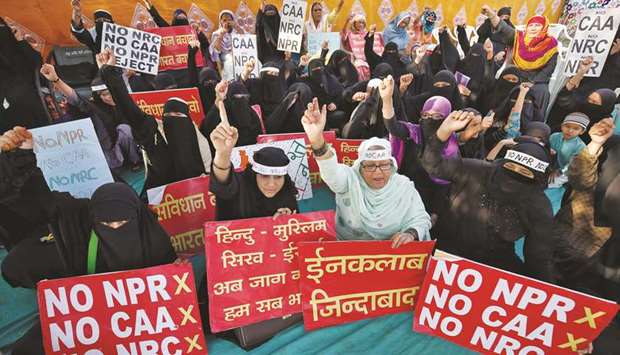
I borrowed the title for this article from a recent statement made by Craig Calhoun while giving an interview (January 2020).
For the readers who do not know Calhoun, he is one of the most renowned American sociologists who has led for long years the US Social Science Research Council, prior to becoming director and president of the world class London School of Economics (2012-2016).
It is a pessimistic statement by him, but he appears under some kind of Gramscian slogan in his interview — “pessimism of the intellect, optimism of the will” — because, in spite of the gloomy picture he gave about Western societies being torn apart in a time of stirred emotions about politics, there is chance, as he put it, to save liberal democracy from the hands of illiberal populists and restore social cohesion.
It’s a difficult and long haul, but he thinks that in spite of all spirals, there are counter-spirals that are waiting to be created.
He thinks that populism has caused disintegration of society, rather than community integration.
It was the victory of popular anger, not of a return to the community in any of its different forms, be that national or local.
People may be suffering from a feeling that they have lost community, a sense of belonging, even national integration.
But this doesn’t do anything in itself to recreate them.
It expresses that anger in a way that allows for these demagogues to rule.
And yet they rule in ways that don’t fix the underlying problems.
That is very true.
Divisive polarisation as an outcome of populism is tearing at the seams of democracies around the world, from some Western established democracies to Brazil and India and from Poland to Hungary.
It isn’t just a Western illness; it’s a global one.
In the cultural sociological writings, populism has not only been interpreted as an ideology (populist nature of a political party), but also as a discursive construction, a strategy, or a political style (communicative style or the performance of a specific leader). Nevertheless, the emerging consensus is to treat populism as a set of ideas, in the form of either a discourse or an ideology; ultimately, it represents a mental map to comprehend the political realm.
As social scientists we wanted to know: Why has polarisation come to a boil in so many places in recent years? Are there any telling similarities in the patterns of polarisation across different countries? And perhaps most importantly, once societies have become deeply polarised, what can they do to start healing their divisions?
In another word, are we witnessing the institutionalisation of populism? Craig Calhoun is clear on that.
For him the institutionalised results of populism are producing damage that will be enduring in different cultural contexts.
That is because he thinks populism is inherently unstable and can go in different directions.
It may be seen as a social movement, a phenomenon with or without a very clear set of ideological directions that gets captured by other political parties or ideologists or demagogues.
The short-term flourishing of such big movements is in many ways expressive, and there are lots of people mobilised without very clear objectives; then there’s the potential for it to be captured, steered and made it into the basis for more structural change.
Barry Eichengreen in his (2018) book entitled “The Populist Temptation: Economic Grievance and Political Reaction in the Modern Era” defines populism from the sociological viewpoint as a movement hostile to pluralism.
This is because populism as a social theory assumes in an absolute manner “the “people” as unitary and their interest as “homogenous”. It is a thin-centred ideology that considers society to be ultimately separated into two homogeneous and antagonistic groups, and which argues that politics should be an expression of the volonte? ge?ne?rale (general will) of the people.
Accordingly, there is no need for painstaking deliberation that gives voice to diverse viewpoints and seeking to balance the interests of different groups.
Those who advocate this line of thinking ignore that the concept of homogenous people has its inevitable implications on the protection of the rights of minorities: racial, ethnic, religious or any other minorities.
Instead they believe that because minorities are different - they are not us - they violate the presumption of homogenous people, a basic presumption of populism, hence they do not belong to the people and there is no need to put emphasis on the protection of their rights, since they have no rights on their own.
An inalienable feature of populism is that its logic is very clear and simple, whatever the consequences.
If we look at this trend through the lenses of a broader paradigm, we can see that we are currently living in an age that witnesses a marriage between populism and nationalism.
From Brexit’s “Take back control” to Trump’s “Make America great again,” to Modi’s “Make in India” initiative, leaders who play the “nationalism card” are building popular support.
Various polls show more people on the far right of the political spectrum, yet in the midst of such intensified nationalist fervour, nations stand as internally divided as ever and the social fabric is fragmented.
How is this possible? How is it that nations can be so divided if nationalism is on the rise? How are we to interpret intensifying national divisions in the face of intensifying nationalism?
In order to explain this paradoxical situation, one can conclude that many of today’s nations are experiencing what I can call “irrational disintegration” of the social fabric of societies.
Such a damaging process is brought about by two interrelated and overlapping mechanisms: social and political polarisation.
While states are staying intact and nationalism as an ideology is getting stronger, nations, as living entities, are getting more polarised, fragmented and split.
This process is, in my opinion, is short sighted and eventually will lead to social capital deficit and the dissolution of nations even if they are territorially intact.
The aftermath of such populist movements is becoming cluster clear of what is happening right now in India between Hindus and Muslims is a clear illustration.
The irrational disintegration that emerges out of this increasingly salient polarisation tendency is not unique to the above mentioned countries alone.
It corresponds to a global pattern of social and political crisis triggered by the anxieties over who owns the nation.
The divide between Shias and Sunnis and other ethnic groups and races in some countries in our region is also a case in point.
I will assign one of my future articles to discuss the context specific populism and disintegration in the Arab world.
In this realm, we should agree, as Arab social sciences researchers, that despite this general pattern towards polarisation within nations, particular historical legacies and contingencies still render each case unique in the ways in which social cleavages interact with social stratifications and socially valued divisions.
Work on this issue is just beginning in our region.
The pressing question is: How can sociology contribute, both methodologically and theoretically, to understanding this global phenomenon while attending to the particularities of each case? In this article I will render a bird eye view on that.
I subscribe to the theoretical framework which recognises the analytical distinction between the two concepts of populism and nationalism but rejects operationalising them as sharply independent.
Researchers in this field critique “purist” and one-dimensional formulations where nationalism and populism are seen as separate horizontal and vertical discourses, respectively.
In this view that I adopt, nationalism constructs “the people” through an in/out dichotomy between the “nation” and outsiders (clash of civilisations, religious attitudes and outlook towards the other, economic rivalry ……….) while populism is structured around a down/ up antagonism between the people “as underdog” versus the people of “ hegemonic cultural capital “. While accepting these definitions, a two dimensional model of populism can be devised where the dual components are inherently “intersecting and mutually implicated”, because “the tight interweaving of vertical and horizontal registers … is central to and constitutive of populist discourse”. The ambiguity of multiple appeals to “the people” is precisely what gives populism its rhetorical and pragmatic power.
To identify contemporary right-wing mobilisations, Brubaker (2017) thus contends speaking of “a national-populist moment in the singular”. This approach does not conflate populism with nationalism or reduce the latter into the former but highlights the “family resemblance” between the two systems of discourse.
More crucial element that I would like to add in this respect is that In order for the far right populists to find a firm ground of legitimacy they recall and revitalise the glorious past and use it as unverifiable given.
Consequently religion comes into play in this duality.
Religiously coloured populist and nationalist discourses in the West and non-west countries are similarly fused.
Religious nationalism is a distinctive kind of nationalism with discursive and institutional specificities.
Discursively, according to (Friedland 2001), it utilises a sacred language to make “religion the basis for the nation’s collective identity and the source of its ultimate value and purpose on earth”. We saw in recent presidential campaigns of right wing leaders in Brazil and Bolivia that both of them held the Bible in their right hind.
Christian identity for populists is strongly linked to a romanticised idea about how things once were.
It promotes an idealised and a historical notion of a harmonious community life that existed before the elites and bad “others” began to endanger the prosperity, rights, and wellbeing of the good people.
In both Latin American countries mentioned above it was used against the left.
But one can notice in such cases that national-populist engagement with religion is generally theologically impoverished and superficial.
Such movements do not essentially embrace religion qua faith or doctrine, but lean on “religious tradition”, that is, “the historical continuity of systems of symbols” that derive from religion, intermingling with ethnicity and nationality.
Other than Christianity researchers, likewise, document the weak and opportunistic engagement of hindutva with the teachings of Hinduism.
Populism sets ‘sacred’ boundaries in place.
Populist leaders speak in terms of the sacred and the profane, the pure and the impure, the righteous and the undeserving.
By definition, populism excludes two kinds of people: the establishment and ‘others.’ As it does so, populism defines the boundaries of the sacred ‘people’ to whom belong heritage, land, culture, and political self-determination.
Battle cries such as ‘build the wall!’ or ‘no more mosques!’ set boundaries in place to keep the sacred people safe from outside threats.
Yet populist boundaries are more than simply the lines of ‘us’ and ‘them.’ They are deeply held to the point of being inviolable.
They will be defended with violence if necessary.
In the exemplary plural nation: India, for example, Prime Minister Narendra Modi’s BJP party is built on the dogma of Hindutva, or Hindu cultural supremacy.
Since coming to power in 2014, Modi has used rhetoric and enabled policies that shape India in a more Hindu image.
Nowhere is this more apparent than in recent policies that introduced the new citizenship law as a tool of oppression against religious minorities, or the policies that prohibit the slaughter of cows – seen as sacred by Hindus – in regions across the country.
Sacred cow policies have been used as a pretext for various episodes of targeted violence and persecution against Muslims, who are labelled as cow killers because they farm and consume beef.
I would like to end this article by saying that populism is not the same as social justice as those leaders who advocate it falsely pretend, and although often twisted to appear to represent the common people, is just as often a distraction away from what is really the exploitation, confusion, even oppression of the common average everyday folks.
The expansion of rights and liberties for any one group is almost never done at the expense of other groups, especially elites.
It can be an invitation for social disintegration.
The element of scaring people and instilling fear in the rhetoric of populist movements inspires fanatic delusions.
Where fear is present, we will also find ignorance, anger, hatred and violence.
The only opposition to fear in politics is hope and confidence, and a belief in the democratic ideal: that people in their multi-cultural, racial and religious background, under the human rights-based rule, as Craig Calhoun put it, are capable of leading inclusive self-determined lives.
Politics of fear used by the populists generates mistrust and erosion of social cohesion among people.
It creates a condition of heightened attentiveness and operates as a warning to be cautious and gives segments of citizens suddenly quick perceptions.
In these moments of quick perception, we are also most vulnerable to deception and error.
We make false judgments and calculations.
Seeing does not always believe, but believing, unfortunately, is often seeing.



